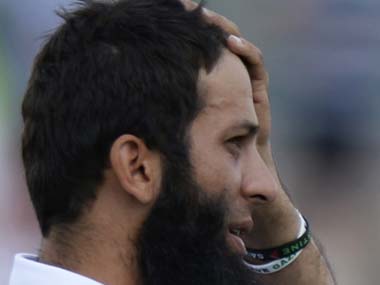It is safe to say that the Test series between India and England has been overshadowed by the James Anderson - Ravindra Jadeja controversy. During the last one week most of the television and print coverage as well as social media conversation has been around this issue. Once in a while it is okay and natural for a controversy to overshadow the game, though I wish we had picked the right controversial issue to talk about. On 28 July, during the third Test, Moeen Ali wore two wrist bands - “Save Gaza” and “Free Palestine”. This was quite similar to the way Malaysian cyclist Azizulhasni Awang “protested” during the recently concluded Commonwealth games. He wore gloves with “Save Gaza” printed on them. Both of them could be either making political statements or humanitarian statements. I do not know. But what I do know is that for a brief period of time the activist athlete returned from the dead. [caption id=“attachment_1652809” align=“alignleft” width=“380”]  Moeen Ali wearing his ‘Save Gaza’ wristbands. Reuters[/caption] I was thrilled to see two athletes standing up for something they believed in. I have always thought the activist athlete was an endangered species, if not extinct, especially since the corporate athlete took over in the 1990s. I had only read stories of Jesse Owens’ refusal to do the Nazi salute at the 1936 Olympic games or Muhammad Ali’s refusal to join the army because of his religious beliefs and opposition to the Vietnam war. Or of Billie Jean King fighting for women’s sporting rights as passionately as she fought for a Grand Slam title. These athletes stood for something larger than just being good at their job. They had opinions and beliefs and were not afraid to voice them in front of the entire world. Take for example American track stars Tommie Smith and John Carlos at the 1968 Mexico city Olympics. To turn attention to the plight of African Americans, the duo received their medals with bowed their heads bowed and raised their black gloved fists. The world called it the “black power salute.” For stepping outside the “established boundaries” the two were stripped off their medals. As Evergreen State College’s track and field coach McConnell states “Supposedly they acted apart from their teammates, and stepped outside of the apolitical box where elite athletes are kept.” Back in the USA, they were subject to abuse and they and their families received death threats. I am glad that moment - the black power salute - happened because it ushered in a golden age of activism in sports. The 1960s, 70s and early 80s saw the likes of Jackie Robinson, Althea Gibson, Muhammad Ali, Billie Jean King, Lisa Leslie, besides, of course, Tommie Smith and John Carlos. So what changed in the 1990s? Suddenly why were there not even a handful of athletes who were pushing controversial political issues? Accordingly to noted sports anthropologist Orin Starn, corporate endorsements and professional leagues changed the game. The athletes stopped taking a political stand and started “representing” their sponsors. The poster boy of this new breed of corporate athletes was Micheal Jordon. He understood what was at stake when he signed his sponsorship deal with Nike. There is a famous story that Jordan did not endorse a black Democratic candidate, Harvey Gantt, in a 1990 North Carolina Senate race against Republican Jesse Helms because he felt “Republicans buy shoes, too.” Professional sports are now major businesses that operate like multinational corporations. Professional athletes are signed on as representatives by companies for millions of dollars. Any athlete or team who publicly embraces a controversial political cause risks alienating people who disagree with their point of view. Millions in potential revenue can be lost. When you want to appeal to as many people as possible, you obviously try to offend no one. Yes, taking a strong political stance is a hazardous activity. It will certainly enrage those with conflicting points of view. Besides most corporate sponsors and sometimes even governments are not going to take too kindly to it. But why must athletes not join the social and political discourse? They must go beyond just opening their wallets and setting up charities, most of which do nothing more than help the athletes save tax and manage their image. Most sports stars yield great power, they must now take up responsibility. Sports does not exist in a vacuum, it does not function in isolation from what is happening in the world. So why must we keep our sports stars in a vacuum where we expect them to only play and entertain us? Athletes are also human beings with opinions on issues they care about. I think it is high time sporting bodies and corporations let athletes engage with their fellow human beings. Every sporting event need not be a political demonstration but once in a while it is good to hear the real voice of the person behind that jersey and the multi-million dollar deals. Moneen Ali and Azizulhasni Awang, more power to you.
Sports needs more athletes like Moeen Ali, who took a stand on the Israel - Palestine conflict.
Advertisement
End of Article
Written by Rashi Kakkar
Rashi Kakkar (@rashi_kakkar) is a business graduate from SRCC who spent most of her teenage years either on a tennis court, swimming pool or football/cricket field. Currently she is trying to understand the social and economic aspects around sports. The only thing she enjoys more than playing sports is talking sports. see more


)
)
)
)
)
)
)
)
)



